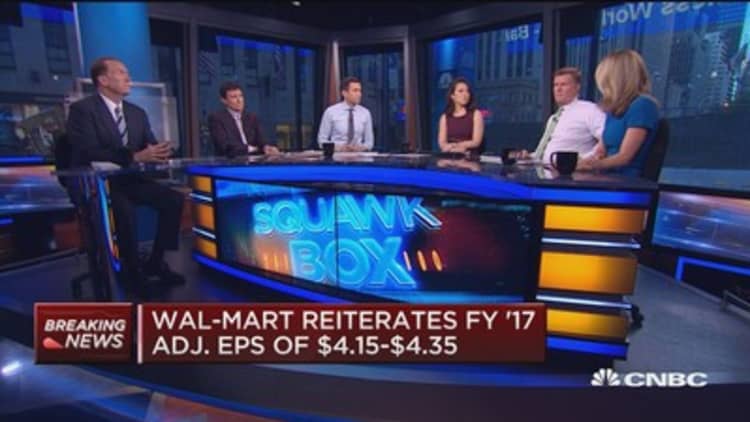
Wal-Mart on Thursday reiterated its guidance for the current fiscal year, and said it expects next year's earnings to come in relatively flat as it invests more in digital and technology.
The world's largest retailer also said it will open slightly fewer stores than originally planned this year, and said it will significantly slow its pace in fiscal 2018.
Wal-Mart outlined its plans for the upcoming fiscal years ahead of its annual investor day in Bentonville, Arkansas.
The low-price chain still expects adjusted earnings per share of $4.15 to $4.35 this year. For fiscal 2018, the company predicts earnings will be relatively flat with this year's adjusted figure. And in 2019, it expects earnings growth of 5 percent.
At last year's investor day, Wal-Mart said it expected earnings per share in fiscal 2018 to increase modestly, and then grow 5 to 10 percent in fiscal 2019.
The company said it will spend $11 billion in capital expenditures this year and next. But more of that money will be going toward e-commerce, including the buildout of distribution centers. Whereas new store growth accounted for almost half of Wal-Mart's $13.1 billion in capital expenditures in fiscal year 2014, it will be less than 20 percent of this spend next year.
Wal-Mart will open 130 U.S. stores, down from its original projection for 135 to 155. And next year, it will open just 55 U.S. stores. That breaks down into 35 supercenters and 20 of its smaller Neighborhood Markets.
"Growth looks very different than it did 16 years ago but there's still so much opportunity for Wal-Mart," CFO Brett Biggs said.
The retailer entered its annual meeting with momentum at its back, including its biggest quarterly same-store sales gain in four years during the period ended July.
Ahead of Thursday's announcement, Wal-Mart shares were up more than 17 percent this year. That was a marked shift from 2015, when investors worried the company's pricey turnaround plan — which included a $2.7 billion investment in wages — would not deliver.
The company's stock entered last year's investor day on a downward slide. It then suffered its steepest daily plunge in 27 years when the company trimmed its full-year sales guidance, and said its earnings per share would contract by 6 to 12 percent in fiscal 2017.
Following Thursday's news, Wal-Mart shares slipped about 3 percent.
"Wal-Mart's forecasts announced this morning are in line with our expectations, especially when the costs involved in building out its online capability are considered," Moody's analyst Charlie O'Shea said. "It will take a while for the company to become a true multi-channel retailer."
Revenue is expected to grow roughly 3 percent on a constant currency basis this fiscal year, which is in line with what the company reported in the first half, Biggs said. It's also at the low end of its previous guidance. Including the impact of currencies, Wal-Mart is forecasting an increase of roughly 1 percent, compared with guidance of relatively flat at the beginning of the year.
The company had previously set a goal to goal to grow its online sales between 20 percent and 30 percent over three years. Though it fell well short of that metric in the first half, Biggs said that excluding the impact of its sale of Yihaodian earlier this year, Wal-Mart's digital sales should come in near that range in the back half, and potentially top it in fiscal years 2018 and 2019.
The company will meanwhile continue divesting parts of its business when it makes sense, including potentially closing more stores down the road. Earlier this year, Wal-Mart closed 269 locations as it shuttered its Walmart Express concept.
"It's not a growth at all costs mindset," McMillon said.
As of Wednesday, analysts expected Wal-Mart's revenue to increase 1 percent this fiscal year, to $487.21 billion, according to Thomson Reuters. They anticipated the company's earnings per share would contract 5 percent, to $4.34.
On Wednesday, Wal-Mart said in an SEC filing that it had nearly doubled its stake in Chinese e-commerce site JD.com, to 10.8 percent. McMillon told investors Thursday that the partnership would help Wal-Mart scale its China business in a cost-efficient way.


